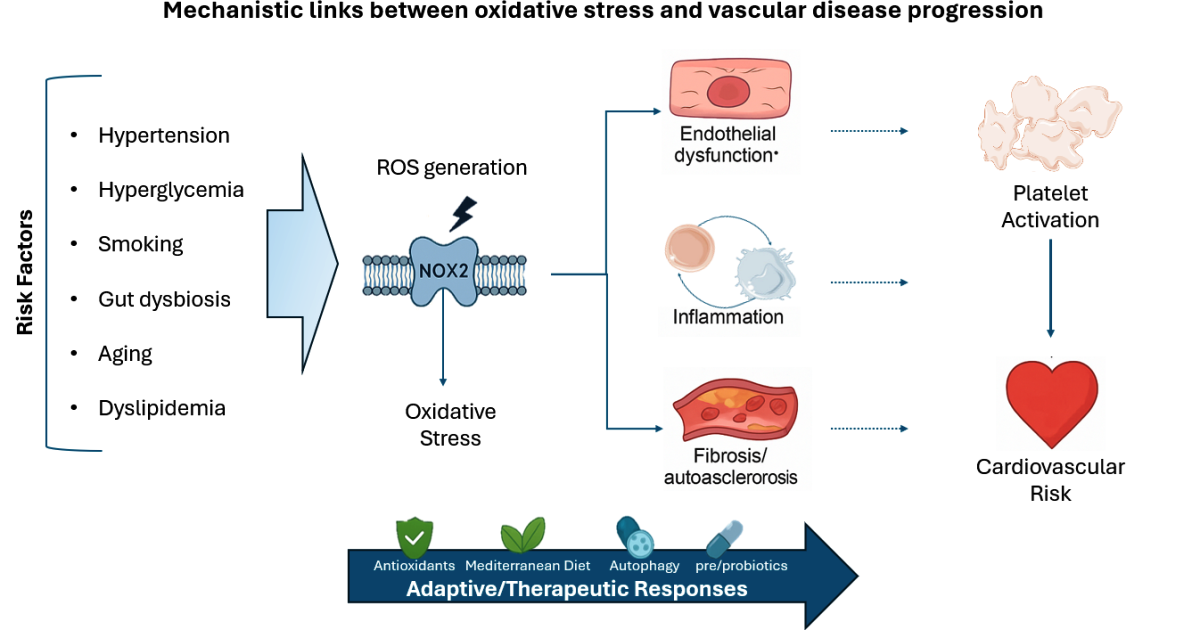- 4.8Impact Factor
- 9.2CiteScore
- 20 daysTime to First Decision
Role of Oxidative Stress in Vascular Diseases
Special Issue Information
Dear Colleagues,
Oxidative stress is a pivotal driver of vascular dysfunction and a recognized contributor to the pathogenesis of cardiovascular diseases (CVDs), including atherosclerosis, ischemic heart disease, stroke, and peripheral arterial disease. The excessive generation of reactive oxygen species (ROS), particularly via enzymatic systems such as NADPH oxidases (e.g., NOX2), disrupts endothelial homeostasis, promotes vascular inflammation, and enhances platelet activation and thrombogenicity.
Clinically, this redox imbalance correlates with adverse cardiovascular outcomes and may serve as both a biomarker and a therapeutic target. Novel insights also suggest that gut-derived metabolites (e.g., lipopolysaccharide, TMAO) and impaired autophagic flux contribute to ROS overproduction and vascular injury, adding layers of complexity to redox regulation in CVD.
This Special Issue will focus on elucidating the cellular and molecular mechanisms underlying oxidative stress in vascular diseases and its interaction with inflammation, thrombosis, and endothelial dysfunction. We welcome submissions that explore mechanistic pathways, translational models, and emerging therapeutic interventions aimed at restoring redox balance—including antioxidant strategies, autophagy modulators, and gut microbiota-targeted therapies.
Our goal is to bridge basic science with clinical perspectives and foster new approaches to risk stratification and treatment in vascular disease.
Dr. Vittoria Cammisotto
Dr. Valentina Castellani
Guest Editors
Manuscript Submission Information
Manuscripts should be submitted online at www.mdpi.com by registering and logging in to this website. Once you are registered, click here to go to the submission form. Manuscripts can be submitted until the deadline. All submissions that pass pre-check are peer-reviewed. Accepted papers will be published continuously in the journal (as soon as accepted) and will be listed together on the special issue website. Research articles, review articles as well as short communications are invited. For planned papers, a title and short abstract (about 250 words) can be sent to the Editorial Office for assessment.
Submitted manuscripts should not have been published previously, nor be under consideration for publication elsewhere (except conference proceedings papers). All manuscripts are thoroughly refereed through a single-blind peer-review process. A guide for authors and other relevant information for submission of manuscripts is available on the Instructions for Authors page. Biomolecules is an international peer-reviewed open access monthly journal published by MDPI.
Please visit the Instructions for Authors page before submitting a manuscript. The Article Processing Charge (APC) for publication in this open access journal is 2700 CHF (Swiss Francs). Submitted papers should be well formatted and use good English. Authors may use MDPI's English editing service prior to publication or during author revisions.
Keywords
- oxidative stress
- vascular disease
- endothelial dysfunction
- NADPH oxidase/NOX2
- platelet activation
- autophagy
- gut microbiota
- inflammation
- reactive oxygen species (ROS)
- cardiovascular risk

Benefits of Publishing in a Special Issue
- Ease of navigation: Grouping papers by topic helps scholars navigate broad scope journals more efficiently.
- Greater discoverability: Special Issues support the reach and impact of scientific research. Articles in Special Issues are more discoverable and cited more frequently.
- Expansion of research network: Special Issues facilitate connections among authors, fostering scientific collaborations.
- External promotion: Articles in Special Issues are often promoted through the journal's social media, increasing their visibility.
- e-Book format: Special Issues with more than 10 articles can be published as dedicated e-books, ensuring wide and rapid dissemination.

